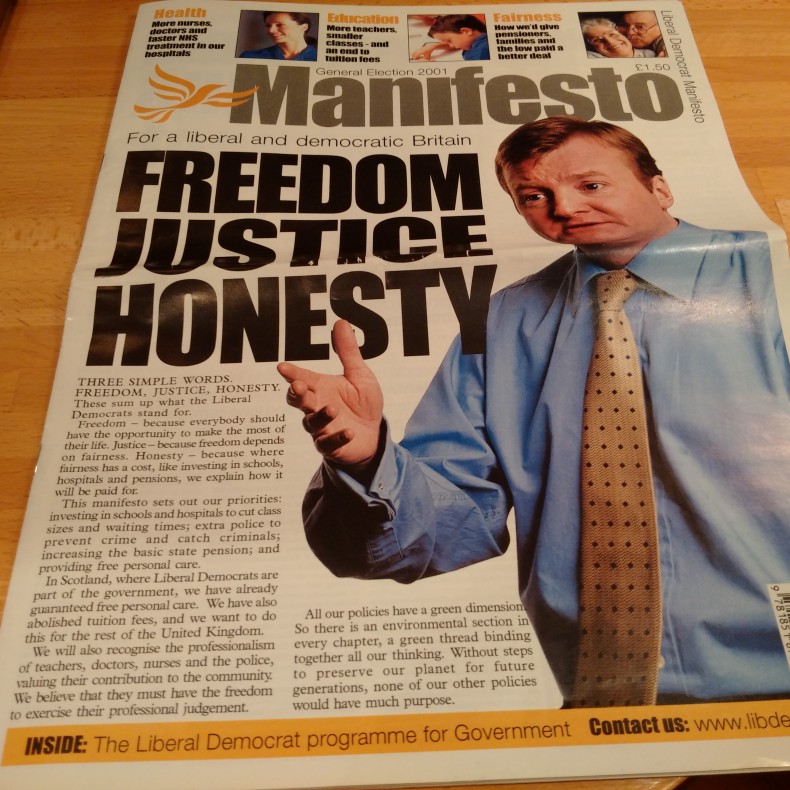The Liberal Democrat policy problem

As I wrote in my piece on what went wrong with Liberal Democrat polling in the general election, the party’s policies weren’t a problem – it was the party’s overall reputation that cost us so dearly:
Political scientists crunching the evidence over how people decide who to vote for (such as in Affluence, Austerity and Electoral Change in Britain) find that policy issues matter much less than ‘valence’ issues.
That is, people don’t decide who to vote for based on looking at policies and seeing how closely a party or candidate’s policies match up to their own preferences. Rather, they lean on decisions over perceived competence on issues where different parties all have the same shared objective. For example, voting Conservative because you think they’ll be best at creating new jobs is a valence choice. All parties want more jobs, so picking the Conservatives is about perceived competence, not ideology.
Although there certainly are ideological choices and they do have an influence, it’s valence that dominates in British elections. Hence the problem for the Liberal Democrats in the general election wasn’t about having controversial policies which people didn’t like. There wasn’t even a small echo of the problems with the immigration amnesty policy of 2010 for example (good policy but burdened with the fatal combination of being both controversial and not amenable to a one-sentence defence). Asked where they put the Lib Dems and themselves on the political spectrum, voters kept on putting the party near to themselves overall.
Rather the problems were valence ones – about competence and trust in particular.
Those valence problems weren’t about left/right, because as Chris Hanretty points out:
Wave 3 of the British Election Study asks respondents to position themselves on a left-right scale which runs from 1 to 11.
On this scale, the (weighted) median voter is at 6, equidistant from either end of the spectrum. For what it’s worth, the (weighted) mean is very slightly to the right of this position, at 6.21…
If closeness to the median voter was the exclusive determinant of parties’ vote shares, we’d be basking in the bright new dawn of a Liberal Democrat government (weighted mean left-right position: 5.77).
Moreover, the lesson from the party’s recovery from the chaotic depths of the merger that formed the party (you think the Edstone was bad? just read up on the party’s inability to agree its name) was that it wasn’t shifting policy left or right, nor adopting a suite of radical, bold, unrestrained policies that mattered.
What mattered was getting the response right on key moments which enabled the party to demonstrate its values: first Hong Kong passports and then the tragedy of former Yugoslavia. Wanting to protect people abroad – by giving them the chance to come to the UK and by intervening against widespread brutality – gave the party a distinctive message and gave the public a clear sense of what the party was about: caring, even for strangers far away.
So what the party’s policy problem isn’t is about needing this or that policy to recover.
What it is, is a more internal one: that we have loads of new members, and indeed many old members, who want to get involved in party policy making – and we certainly need to get our policies right even if they’re not the number one solution to our predicament.
Yet we have a policy making process that doesn’t suit mass involvement very well.
On paper, it looks like it does because there’s a democratic process with policy working groups that any member can apply to be part off and with motions and votes at party conference (soon to be opened up to all party members). In practice, it usually works pretty well too – especially for members who know (or who know to ask) how the details of the system work.
But there’s a huge drawback. It’s that the core of the policy making process – policy working groups reporting to conference, with their eventual policy papers then the source material for a general election manifesto – means the answer to ‘how can I help make party policy on X?’ often is really ‘wait for a working group on that in a few years time’.
That’s a really off-putting response. It’s not quite the whole story because you can still put in motions to party conference before then – and some have a really big impact, so I don’t want to downplay that too much. But that’s very much a one-off short term piece of involvement in policy making (and also constrained by conference agendas usually avoiding returning to the same topics too frequently unless something has happened in the outside world).
Structurally, the party’s policy making process is designed around paying attention to a few topics at a time, rotating around them over years. So if you’re a new, keen member you may hit lucky – or hit very unlucky.
That seems to me an increasingly uncomfortable structure, and a good reason to think about ways to make policy making across all areas more of an ongoing process that can involve people when they’re interested, not when the policy calendar creaks around to them.
So what do you think…?
Leave a Reply